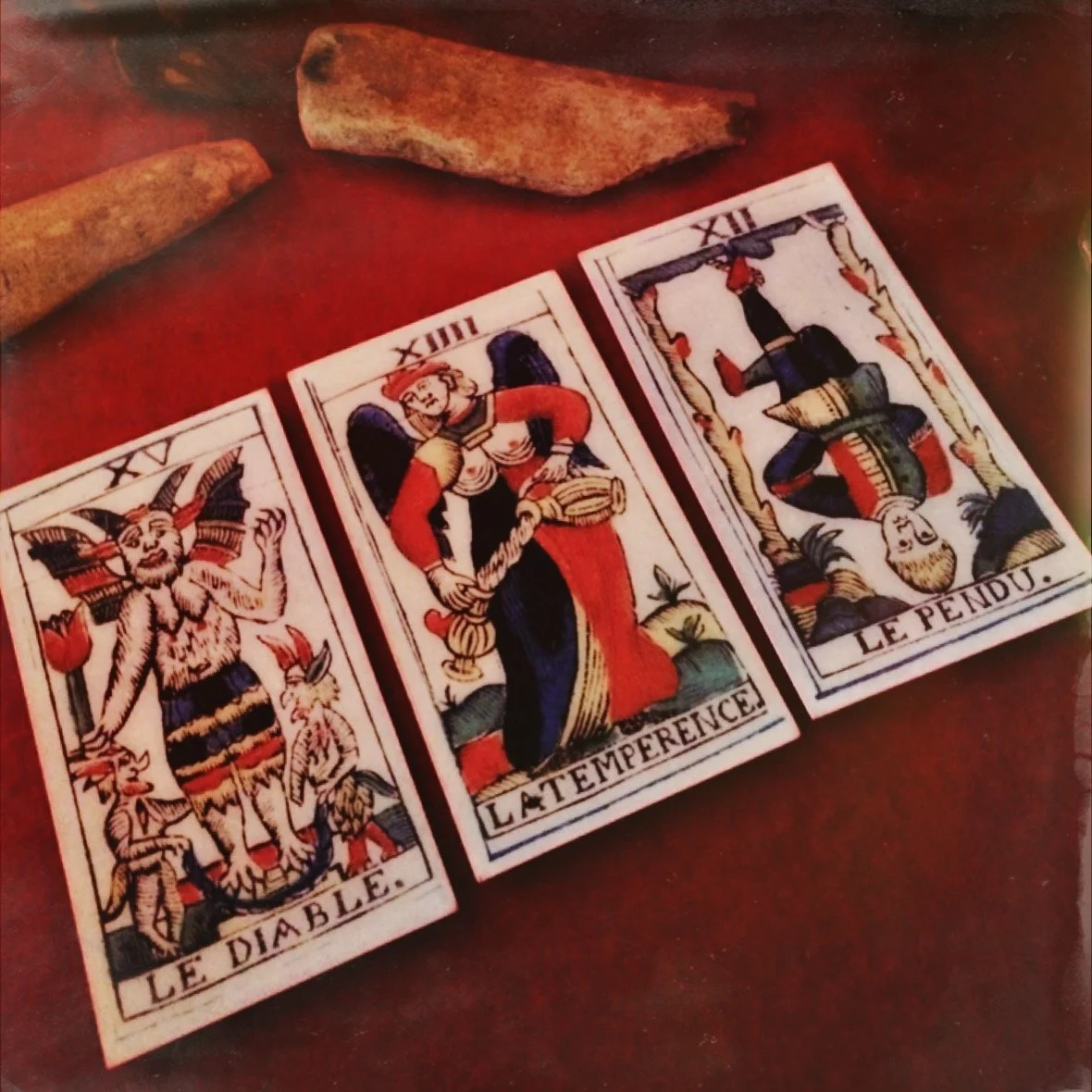The inner voice as a dimwit
Carolus Zoya Marseille Tarot
Sometimes I think about the gifts we receive, and I admit that I’m always happy for myrrh, frankincense, and gold… And yet there’s one gift that I appreciate the most: the gift of voice, the clear voice I want to listen to. But how do I know it?
Have a look at these cards above: the Devil, Temperance, and the Hanged Man.
The Devil says: ‘You can do anything.’ Circumstance says: ‘Today you hang.’ Temperance in the middle says: ‘Know how to mix these voices.’ In the Devil’s voice, what appears as a manifestation of confidence is actually a bidding for overconfidence. Just look around: how many manifestations of hyperbolic speech have you experienced today already? Too many.
In the Devil’s voice whatever overpowers you becomes this figure of speech: ‘believe in yourself.’ But if circumstance says: ‘Not today. Today you can’t do a thing, including believing in yourself, because I rule,’ what do you do? Flock to the place where they dispense hyperbolic speeches about your greatness and infallible entitlement? For free? Or, you’d think this is for free, but think again. If you make a pact with the wrong Devil to only ever hear about how great you are, simply because that makes you feel good – ‘supported, understood, and loved’ – you will pay a price. A hefty one. Not just money. More like dismissal from the ones who can see what’s happening, and then think of you along these lines: ‘what a dimwit…’
Don’t be a dimwit, says Temperance
What Temperance here says is this: ‘Don’t be a dimwit.’ Indeed, we have enough dimwit politicians already whose only ‘suffering’ is overconfidence that they instill in others. For no other reason than to get elected. Other dimwits fall for the song of the siren, and before you know it, we’re with the Hanged Man situation, the one that can’t be helped. All because ‘I believe in myself’ feels so good. But when are feelings ever relevant, if the aim is to see things as they are, the domain of Temperance here displaying the virtue that entices us to distinguish between narratives?
I bring this in because it has relevance for the topic on my mind these days, that of how we follow through with answering a calling. Sometimes ‘listening to your inner voice’ simply means listening to what you’re craving to hear, to what makes you feel good and reassured. Sometimes the inner voice is just a dimwit voice, not the clear voice of what you imagine your intuition is all about. Instead of listening to this voice, it’s better to acknowledge that sometimes the situation doesn’t help you, and that’s all there is to it. In this case, the best wisdom is the Solomonic wisdom captured in the obvious in impermanence, ‘this too shall pass.’
The answer to the situation that can’t be helped is not overconfidence, or belief in a fashioned self that performs according to the Devil’s score. The answer to the situation that can’t be helped is waiting; wait for it to pass, or wait for providence to kick your fate into new action.
Don’t be naive, says Martin Shaw
Once I came across some apt words from an interview with mythologist and storyteller Martin Shaw that may ring an even stronger bell than my own here:
We can’t be naïve in times like this, because we are in the presence of underworld forces that will do one of two things: they will either educate us, or annihilate us. And in fairy tales whenever the movement is down – and the movement culturally is down right now – you have to get underworld smart, have underworld intelligence, underworld metis. I have a strong feeling that a lot of what wants to emerge through many ancient stories is a kind of wily, tough, ingenious and romantic force that needs to come forward at this point in time.
I like to think of Shaw’s ‘romantic force’ as the force that is actually connected with being able to distinguish between the forces that enslave us and the ones that liberate us. Many enslaving forces will look like the liberating ones, but it’s easy to check. Just ask yourself: ‘how desperately do I want to hear the words, I love you, dispensed by complete strangers who will promise the world of safety to me, often marked by popular cliché lines à la: ‘I’ve got you?’ As far as I’m concerned, when these lines reach me, I always go: ‘You do? How? You know nothing about me. Fuck off.’
When that is said, love what you will, but know that some loves are not realistic. Know that ‘healing and growing’ are just buzz words, filler words that stand in for the lack of imagination some card readers suffer from. What do you think all those popular ‘tarot spreads’ are all about, that ones that ask you to check with ‘who you are in the tarot,’ ‘how you help and heal,’ and ‘what lesson you’re here to learn?’
It’s not true that we are not limited, because we are, nor is it true that there are never any external conditions that can rule over us, because there are. As far as I’m concerned, I prefer to love seeing what is the case, seeing things as they are – even when seeing itself can be deemed a performance – to the bogus narrative that casts me in the role of superwoman, who, ironically, needs others to ‘hold space’ for her. I don’t fall for that. It’s not good for the realization of my vocation.
May we all enjoy the gift of a clear voice, and the ability to distinguish between the tones and variations that the cards present us with. We want to hear the inflections that the cards are invested with, when we approach them from the perspective of a clearly articulated question.
* * *
For hearing the trumps of the tarot speak individually, I recommend the essay in two parts, 22 trumps according to the question.
On hearing for a purpose, check out Tarot for Vocation, a workshop followed by a live Q&A and training session that has some interesting things to say about how we avoid listening to the ‘inner voice’ that sometimes is nothing but a representation of a dimwit imbecile.
For more of Shaw’s work, read his essay: We Are In The Underworld And We Haven’t Figured It Out Yet, or as ever, some of my books.


